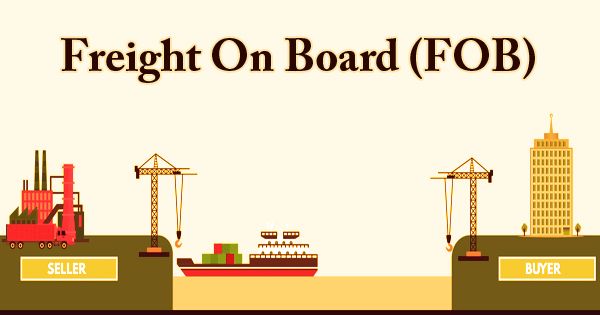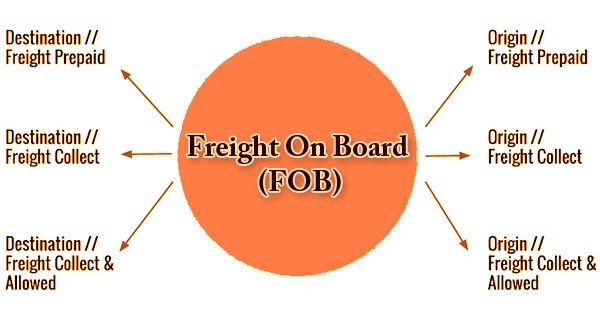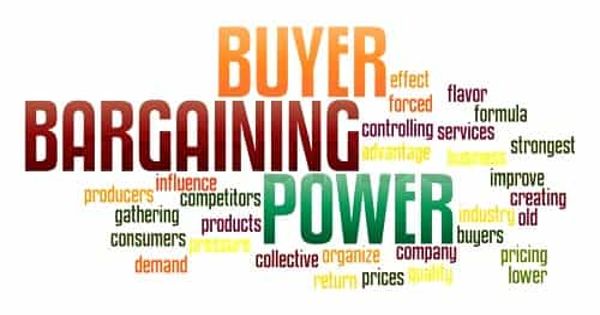Freight on Board (FOB) is a concept in international commercial law that defines at what point, under the International Commercial Terms (also known as Incoterms) standard published by the International Chamber of Commerce, the respective obligations, prices, and risk involved in the distribution of products move from the seller to the buyer. “FOB shipping point” or “FOB origin” signifies the purchaser is in danger and takes responsibility for once the merchant transports the item. It shows where the expenses and dangers of sent merchandise move from the vendor to the purchaser. The term is used in modern domestic shipping to denote the time when the seller is no longer responsible for the goods being delivered and when the buyer is responsible for paying the cost of transport.
“FOB origin” means that the customer pays the expense of shipment from the factory or warehouse and acquires possession of the product as soon as it leaves the point of origin of the goods. “FOB destination” means that, once the goods reach the buyer, the seller maintains the risk of failure. Preferably, the vendor pays the cargo charges to a significant port or other transportation objective and the purchaser pays the vehicle costs from the stockroom to his store or merchants. Coxcomb terms of offer build-up which party (seller or retailer) will be obligated for the transportation costs, which gathering is in charge of the development of the merchandise, and when (date/time) the title passes to the purchaser. The freight hauler or shipping company (such as FedEx, UPS, and Conway) is not involved in most cases, but the freight hauler is still responsible in some instances. However, a freight hauler is often responsible for the harm it may cause in transit.

(Example of Freight On Board)
The FOB is only used for the movement of non-containerized sea freight or inland waterways. FOB does not specify the point at which the ownership of the products is passed, as with all Incoterms. The cargo ownership is independent of Incoterms. In global exchange, responsibility for the payload is characterized by the bill of filling or waybill. Agreements including global transportation regularly contain contracted exchange terms that depict matters, for example, the time and spot of conveyance, installment, when the danger of misfortune shifts from the vendor to the purchaser, and who pays the expenses of cargo and insurance.
The expression “freight on board” (FOB) began from the times of cruising ships when merchandise were “disregarded the rail by hand”, as characterized in Incoterm. Coxcomb was additionally used to allude to merchandise moved by transport since ocean transport was the principal technique for moving payload from far nations. Since then, the use of the term has shifted, and its meaning varies from one nation and jurisdiction to another. One of the most critical aspects of FOB terminology is that, when it is in transit, it helps decide which party owns the freight. In the event that the cargo is harmed or lost, the protection strategy of the proprietor is as a result. Accordingly, it’s critical to be clear about the terms and realize who is liable for the shipment at each phase of its excursion. The term ‘FOB’ is written in a purchase agreement in North America to decide whether the responsibility and liability for the shipped cargo is passed from the seller to the buyer.
FOB is only used for sea freight under the Incoterms 2010 standard issued by the International Chamber of Commerce and stands for Free On Board. The definition is often used in combination with a loading port. Delivery terms influence the purchaser’s stock expense since stock expenses incorporate all expenses to set up the stock available to be purchased. The dealer is needed to meet his commitments with respect to the products. The cost of moving merchandise from the seller’s warehouse to the buyer’s shop includes the cost of shipping goods to the port of shipment, the cost of loading goods into the shipping vessel, the cost of shipping goods, the cost of unloading goods, insurance and the cost of transporting goods from the port of arrival to the final destination.
The purchaser pays for all expenses past that point, including dumping. Duty regarding the products is with the merchant until the merchandise are stacked on board the boat. When the load is ready, the purchaser expects the danger. In purchase orders, every vendor-client transaction should have the FOB words written out very clearly. It’s better to provide a common set of conditions for a retailer that can be agreed on a per-vendor basis. This will save migraines and cost not far off. Despite the fact that FOB has for quite some time been expressed as “Freight On Board” in deal phrasing, this should be maintained a strategic distance from as it doesn’t accurately adjust to the importance of the abbreviation as determined in the UCC (Uniform Commercial Code).
The more frequently a company buys inventory, the more charges it would pay for shipping and insurance. A company may also incur costs for placing an order, hiring workers to unload the items, and renting a warehouse to store the goods. Through purchasing higher quantities and reducing the amount of individual shipments it carries in, a business will reduce its inventory costs. Some FOB add-on terms might be remembered for the cargo receipt, bill of filling, or different types of delivery documentation. These FOB add-on terms may incorporate the accompanying:
- FOB Origin, Freight Prepaid: The seller/shipper bears the cost of delivery, while at the point of origin; the buyer/receiver of products assumes responsibility for the goods.
- FOB Origin, Freight Collect: The customer accounts for the expense of freight and delivery and takes full responsibility for the cargo.
- FOB Origin, Freight Prepaid, & Charged Back: The seller does not pay the cost of delivery, but instead adds to the invoice sent to the buyer the freight costs. Since the freight expense has been included on the invoice, the customer pays the bill on a more expensive invoice. The buyer also takes ownership of the products and, at the point of origin, assumes responsibility.
- FOB Destination, Freight Prepaid: Until the cargo arrives at the buyer’s shop, the seller/shipper covers all the shipping costs. Any delivery expenses are not charged by the customer.
- FOB Destination, Freight Collect: Upon receipt of the goods, the receiver of the goods (the buyer) pays the freight charges. When the cargo gets to the buyer’s premises, the buyer does not assume responsibility or liability for the goods.
- FOB Destination, Freight Prepaid, & Charged Back: Until the goods are shipped, the seller takes responsibility for the freight, and the buyer deducts the costs from the invoice. In the original invoice, the freight costs originally charged by the seller are included.
- FOB Destination, Freight Collect, and Allowed: The shipper applies to the invoice the freight costs, and the customer pays the charges. Until delivery, the seller assumes the responsibility for the freight.
Now and then FOB is utilized in deals to hold commission by the external agent; It is hazy where this started. It’s critical to comprehend the points of interest of the FOB expressions so all gatherings realize what is normal and who will be answerable for unanticipated charges and expenses. Both Cost, Insurance, and Freight (CIF) and Freight on Board (FOB) are global delivery terms utilized in the transportation of load from the dealer to the purchaser. Albeit the two terms are utilized along these lines, their definitions change from country to country.
Information Sources:
















